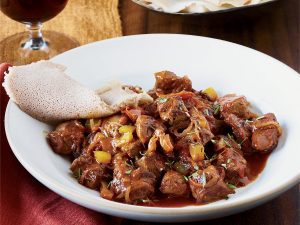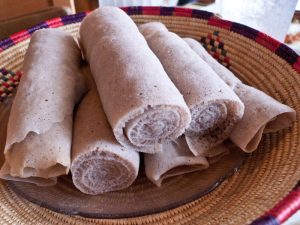 Awaze Tibs Beauty A120809 Food & Wine Gastronaut & Ethiopian Nov 2012
Awaze Tibs Beauty A120809 Food & Wine Gastronaut & Ethiopian Nov 2012
Ethiopian food has always been special to my family, it has been a marker of important events like birthdays or graduations and a comfort food in times of stress or sadness. It was through my knowledge of Ethiopian food that I my best friend in middle school. As third generation Americans, my parents have very few ties left to the cultures that they originally came from. American culture is so obtuse and blended that I think my parents felt the urge to come up with their own traditions. Instead of celebrating cultural significance, they chose to celebrate personal significance. They spent a lot of time working in Ethiopia and Kenya, my father as an anthropologist and my mother as a nurse. When my siblings and I were born we were fed tibs and injera on the regular and they quickly became our favorite foods. Tibs is a spicy beef dish (but it can be lamb as well) with tomato and berbere (a traditional Ethiopian spice). It often includes a hardboiled egg which my siblings and I fought for. Instead of utensils a flat spongey bread called injera is used to scoop up the food.
The first time I met my future best friend, I had just moved to New York from Colorado and I was feeling very insecure in my new setting but I noticed he was eating injera so I asked him about it, and that conversation led to a close friendship. Even during times when my family was very busy and I would sometimes hardly see my brother and sister, we would all get together on Sunday and make a big Ethiopian meal for dinner. When I was first diagnosed with my disorder my dad went out and picked up tibs for everyone so we would have it waiting for us when we got back from the hospital. It has been a marker of almost every major life event I have had so far. Ethiopian food reminds me of my family and how caring and supportive they are. As cliché as it may sound it brings us together, even in busy and unpredictable times.
I feel ashamed to admit that just about the only thing I know about ethnic communities in Atlanta is through the availability and variety of food around where I live. When I lived in upstate New York my family would make a two-hour drive to the nearest Ethiopian restaurant around once a month but when I got to Atlanta I found that there were at least three different Ethiopian restaurants within walking distance of my apartment. I have tried maybe six or seven different Ethiopian restaurants in Atlanta now and each one has their own way of preparing and presenting the dishes. Some of them have a normal dining set up while others use a more traditional short table made of woven fibers. Each dish is spiced slightly differently. Sometimes the dished are so different, calling them by the same name seems strange. I also have a little experience with the refugee communities housed on the outskirts of Atlanta. During a filming project I worked in a community made up of Syrian families. The family that I spent the most time with always served tea and fresh fruit to us when we visited. Exploring how people who have been wrenched from their homes and transplanted into a completely new culture hang on to cultural traditions in the form of food and food practices would be very interesting to study. Since most of the physical possessions these people owned have long since been destroyed, cultural practices and things like stories and recipes could be extremely important in connecting them with their ancestry and homes.
